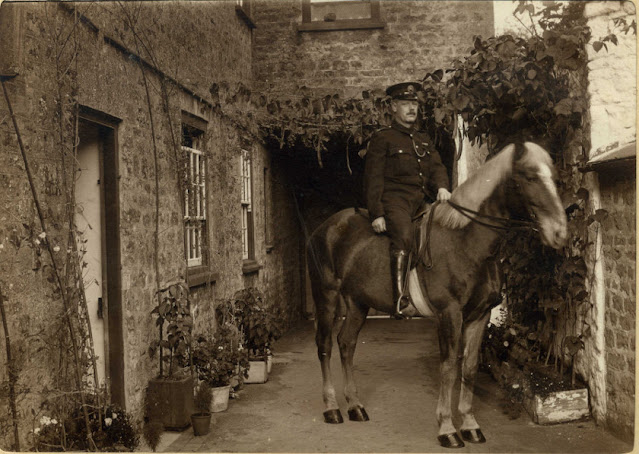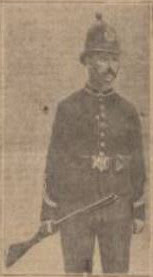Featured
- Get link
- X
- Other Apps
A Policeman's Lot is Not a Happy One
“A Policeman's Lot is Not a Happy One” was a popular song from The Pirates of Penzance by Gilbert & Sullivan, since 1880. I am sure Grandad Beck, heard this and chuckled, he loved his job and working in Dorset but others were not so happy.
Grandad Beck was promoted to Sergeant in 1908, while the family were living at Upwey. As a police constable he would have been working long hours, 7 days a week, the family must have only seen him for short periods each day. While his promotion would not have effected the hours he worked, it would have meant a modest increase in pay. Police Officers had 5 days annual holiday, for Lionel and May it must have been strange to see their father out of uniform. The newspapers reports of the Joint Standing Committee meetings (1909-1914), shows how this was all to change. The police Weekly Rest Day Act of 1910 was to give all policemen 1 day off per week, this was voluntary for the police forces until becoming mandatory on 26th July 1914, just before war was declared.
The request for policemen to assist the military in 1910 came as Dorset, along with other force, were having problems retaining and recruiting men. Young men, including Great Uncle Ernest, were joining the Metropolitan Police as they paid more. First a report about mounted police, which gives me an excuse to show you this photograph of Grandad Beck again. This was taken in the 1920s when he was a Superintendent at Beaminster.
 |
| Grandad Beck riding one of the horses at Beaminster Police Station |
Mounted Policemen
In April 1910 the Chief Constable asked for nine sets of riding equipment for the superintendent's horses. Horses were used for the Superintendent's carts but were suitable for riding as well. The Home Office had issued a circular to the effect that a mounted man was more effective than 20 men on foot in dealing with a riot or crowd. The Committee did question if this would be required in Dorset. In the past the Yeomanry had lent the saddles and other equipment to the police but the regiment was recruiting and were less likely to be able to assist. The committee agreed to buy the equipment at a cost of £70.
 |
| Mounted P.C. 33 from Grandad Beck's photographs |
Police rest day
In April 1909 the Standing Committee discussed allowing the men one day off a month. They lived a hard and monotonous life and it would be a good thing if they could be granted such a privilege. The Chief Constable said he would be happy to do this but it came down to finances.
In January 1910 the committee discussed the Police Weekly Rest Day Act 1910. This became mandatory on 26th July 1914. As it would require more policemen the committee were in not hurry to implement this.
In July 1912 the committee agreed with the Chief Constable to implement one rest day a fortnight. In rural areas the Chief Constable said the constables, would have their gardens to attend to in the country districts, and were not likely to go away, nor would the rest day prevent the men from giving attention to anything of a serous nature that might occur on their beats. Therefore it was agreed to increase Poole and Dorchester divisions by two men each. This required them to apply to the Home Office to employ four more constables and to bring the Weekly Rest Day Act into force in a modified form. By January 1913 the fortnightly rest day had been introduced and from 1st July 1914 a weekly rest day. This was short lived because 32 days later, Britain was at war and days off and holidays were cancelled.
Military Manoeuvres
July 1910 the War Office had requested some police officers to be attached to the detachment camps for military manoeuvres. As this meant the men would be away from home, sergeants would receive an extra 4 shillings and constables 3 shillings per day. A member of the Committee, Colonel Simonds said: "do they get this amount extra for having a nice summer holiday?" At the following meeting in October the Chief Constable was able to inform the committee that the manoeuvres had passed of well in the county. He had had several letters of thanks, the commanders appreciated the intelligence displayed by the officers of the force attached to the Army and of the good work done by the police generally.
Dorset men joining Metropolitan Police Force
A petition had been received from the men about their low pay in 1911, when compared with other forces. Police Constable Hayward resigned to join the Met Police where he would get better pay. The Committee discussed this when P.C. Hayward asked for his superannuation to be returned to him in January 1911. £4 8 shillings 9 pence had been deducted from his pay during the 3 years and 84 days he had been with the Dorset Constabulary. The Committee felt Dorset Police had provided the training that the Met were now going to benefit from, therefore they decided to keep the superannuation to cover the costs of his training and as a deterrent to other men following suit. The whole force has been informed that any other constable who leave, to join the Met police or other force, will forfeit their superannuation payments. The Chief Constable was finding it difficult to recruit suitable men to join the force as they preferred to join the Met and other larger forces were the pay was better. I am sure this was why Grandad Beck's brother Ernest joined the Met Force. In April 1911 the Committee agreed to increase the pay of Constables.
 |
| Great Uncle Ernest and Grandad Beck C.1910 |
All original content by Sylvia Collins is copyright protected.
Ref: Quotes in italics
Bridport News
1909: 16 April p7
1910: 17 April p7; 22 July p7; 21 October p6
Exeter and Plymouth Gazette
1911: 2 February p4
Western Gazette
1911: 3 February p6; 14 April p4
1912: 26 July 1912 p4
1910: 4 February p5
1913: 31 January p2
1914: 24 July p5
- Get link
- X
- Other Apps
Popular Posts
The Wilfully and Malice Murder of Winifred Mitchell
- Get link
- X
- Other Apps


Comments
Post a Comment